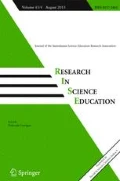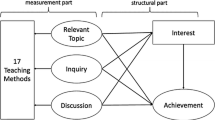Abstract
The purpose of this study is to examine the effect of two strategies for negotiating the question for exploration during science inquiry on student achievement and teachers' perceptions. The study is set in the context of the Science Writing Heuristic. The first strategy (small group) consisted of each group of four students negotiating a question for inquiry with the teacher while the second strategy (whole class) consisted of the entire class negotiating a single question for inquiry with the teacher. The study utilized a mixed-method approach. A quasi-experimental repeated measures design was used to determine the effect of strategy on student achievement and semi-structured teacher interviews were used to probe the question of teacher perceptions of the two strategies. Teacher observations were conducted using the Reformed Teaching Observation Protocol (RTOP) to check for variation in implementation of the two strategies. Iowa Test of Basic Skills Science (ITBSS) (2005 and 2006) and teacher/researcher developed unit exams (pre and post) were used as student achievement measures. No statistically significant differences were found among students in the two treatment groups on the ITBSS or unit exams. RTOP observations suggest that teacher implementation was consistent across the two treatment strategies. Teachers disclosed personal preferences for the two strategies, indicating the whole class treatment was easier to manage (at least at the beginning of the school year) as students gained experience with science inquiry and the associated increased responsibility. Possible mechanisms linking the two strategies, negotiated questions, and student outcomes are discussed.


Similar content being viewed by others
Notes
Brackets are used to indicate the interviewer’s additions to highlight nuances in the interviewee’s response. Parentheses are included as part of the interviewee’s response.
References
Ausubel, D. P. (1968). Educational psychology: a cognitive view. New York: Holt, Reinhart, Winston.
Cangelosi, J. S. (2008). Classroom management strategies: gaining and maintaining students’ cooperation (6th ed.). Hoboken: Wiley.
Cavagnetto, A. R. (2008). Factors influencing the implementation of the science writing heuristic in two elementary science classrooms. In B. Hand (Ed.), Science inquiry, argument, and language: A case for the science writing heuristic. Rotterdam, The Netherlands: Sense.
Cazden, C. B. (2001). Classroom discourse: the language of teaching and learning (2nd ed.). Portsmouth: Heinemann.
Crawford, B. A., Krajcik, J. S., & Marx, R. W. (1999). Elements of a community of learners in a middle school science classroom. Science & Education, 83(6), 701–723.
Dweck, C. (1986). Motivational processes affecting learning. American Psychologist, 41(10), 1040–1048.
Field, A. (2005). Discovering statistics using SPSS. Thousand Oaks: Sage.
Ford, M. J. (2008). Disciplinary authority and accountability in scientific practice and learning. Science & Education, 92(3), 404–423.
Gee, J. P. (2004). Language in the science classroom: Academic social languages as the heart of school-based literacy. In E. W. Saul’s (Ed.), Crossing borders in literacy and science instruction: Perspectives on theory and practice (pp. 13–32). Arlington: NSTA.
Hand, B. (2008). Science inquiry, argument, and language: A case for the science writing heuristic. Rotterdam, The Netherlands: Sense.
Hohenshell, L. M., & Hand, B. (2006). Writing-to-learn strategies in secondary school cell biology: A mixed method study. International Journal of Science Education, 28(2-3), 261–290.
Huang, Y., Wang, L., & Shi, J. (2009). When do objects become more attractive? The individual and interactive effects of choice and ownership on object evaluation. Personality and Social Psychology Bulletin, 35, 713–722.
Keys, C. W., Hand, B., Prain, V., & Collins, S. (1999). Using the science writing heuristicas a tool for learning from laboratory investigations in secondary science. Journal of Research in Science Teaching, 36, 1065–1084.
Kirk, R. E. (1999). Statistics: An introduction. Orlando: Harcourt Brace College Publishers.
Lemke, J. (1990). Talking science: Language, learning and values. Norwood: Ablex.
Mehan, H. (2001). What time is it Denise?: Asking known information questions in classroom discourse. Theory Into practice, 18(4), 285–294.
Mortimer, E. F., & Scott, P. H. (2003). Meaning making in secondary science classrooms. Philadelphia: Open University Press.
National Research Council. (1996). National science education standards. Washington: National Academy Press.
Newton, P., Driver, R., & Osborne, J. (1999). The place of argumentation in the pedagogy of school science. International Journal of Science Education, 21(5), 553–576.
Norris, S. P., & Phillips, L. M. (2003). How literacy in its fundamental sense is central to scientific literacy. Science & Education, 87(2), 224–240.
Novak, J. D. (1998). Learning, creating, and using knowledge: Concept maps as facilitative tools in schools and corporations. Mahwah: Lawrence Erlbaum Associates.
Novak, J. D. (1977). A theory of education. Ithaca: Cornell University Press.
Nystrand, M. (2006). Research on the role of classroom discourse as it affects reading comprehension. Research in the Teaching of English, 40, 392–412.
Piburn, M., & Sawada, D. (1999). Reformed teaching observation protocol (RTOP) (Tech. Rep. IN00-1). Retrieved September 8, 2006, from http://cresmet.asu.edu/prods/rtop_files/RTOP_Reference_Manual.pdf.
Poock, J. R., Burke, K. A., Greenbowe, T. J., & Hand, B. M. (2007). Using the science writing heuristic in the general chemistry laboratory to improve students’ academic performance. Journal of Chemical Education, 84(8), 1371–1379.
Stefanou, C. R., Perencevich, K. C., DiCintio, M., & Turner, J. C. (2004). Supporting autonomy in the classroom: ways teachers encourage student decision making and ownership. Educational Psychologist, 39(2), 97–110.
University of Iowa, Iowa Testing Program. (2006). The Iowa tests of basic skills. Retrieved November 11, 2005, from http://www.education.uiowa.edu/itp/itbs.
Vygotsky, L. S. (1978). Mind in society: The development of higher psychological processes. Cambridge: Harvard University Press.
Wallace, C. S., & Narayan, R. (2002). Acquiring the social language of science: Building science language identities through inquiry-based investigations. Paper presented at the Conference on Philosophical, Psychological, and Linguistic Foundations for Language and Science Literacy Research, University of Victoria, B.C., Canada. (September).
Wallace, C. S., Hand, B., & Prain, V. (2004). Introduction: Does writing promote learning in science? In C. S. Wallace, B. Hand, & V. Prain (Eds.), Writing and learning in the science classroom (pp. 1–8). Dordrecht, The Netherlands: Kluwer Academic Press.
Willingham, D. T. (2009). Why don’t students like school. American Educator, 33(1), 4–13.
Author information
Authors and Affiliations
Corresponding author
Rights and permissions
About this article
Cite this article
Cavagnetto, A.R., Hand, B. & Norton-Meier, L. Negotiating the Inquiry Question: A Comparison of Whole Class and Small Group Strategies in Grade Five Science Classrooms. Res Sci Educ 41, 193–209 (2011). https://doi.org/10.1007/s11165-009-9152-y
Received:
Accepted:
Published:
Issue Date:
DOI: https://doi.org/10.1007/s11165-009-9152-y




